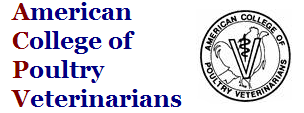The American College of Poultry Veterinarians® (ACPV) is an AVMA-Recognized Specialty Organization.This means that the American Veterinary Medical Association (AVMA) has recognized ACPV as a veterinary specialty, meeting AVMA standards regarding training requirements, examination development and procedures of the organization. Veterinarians who become Diplomates in ACPV are said to be “board certified.” WHAT IS THE PROCESS TO BECOME ACPV BOARD-CERTIFIED?An individual who is board-certified by ACPV has graduated from a veterinary school followed by several years of advanced training and/or experience in poultry medicine. An applicant then must be credentialed. A detailed description of the credentialing requirements can be found in the ACPV Policy on Credentialing. Once credentialed, board-certification is awarded if, or when, the individual demonstrates an advanced level of knowledge and skill by successfully passing a certification examination developed and administered by the ACPV. WHAT DEGREE IS RECEIVED?Individuals that have successfully passed the ACPV board-certification examination are said to be ‘Diplomates’ although no academic degree is awarded. ACPV Diplomates identify themselves as Diplomates by identifying the College after their name. For example, John Doe, DVM, Diplomate ACPV, or John Doe, DVM, DipACPV, or John Doe, DVM, MS, dACPV. ‘Diplomate’ is not a title that can be copy-righted and therefore there is no legal restriction on organizations that are not AVMA-Recognized Veterinary Specialty Organizations awarding the same designation. It is, however, against AVMA policy for veterinarians who are not board-certified by one of the AVMA-Recognized Veterinary Specialty Organizations to represent themselves as specialists and, in fact, doing so would be against many state laws governing the practice of veterinary medicine. IS SPECIALIST THE SAME AS BOARD-CERTIFIED?The terms ‘specialist’ and ‘board-certified’ are used interchangeably to designate the same thing. The AVMA, and many state veterinary practice acts, limit the use of the term ‘specialist’ to those individuals who have been board-certified by one of the AVMA-Recognized Veterinary Specialty Organizations. WHY WOULD A VETERINARIAN WANT TO BECOME A SPECIALIST?There is no one answer as to why individuals pursue board-certification in a veterinary specialty. Some are motivated by the desire to be on the leading edge of the practice of veterinary medicine, others may be pursuing jobs in academia or private industry where specialty certification might be a requirement. WHAT ARE THE DIFFERENT SPECIALTIES?ACPV is one of 22 different AVMA-Recognized Veterinary Specialty Organizations.
HOW ARE SPECIALISTS IMPORTANT TO THE PROFESSION?Specialists perform an important role in the continuum of health care of animals in that they offer services, knowledge, and skills beyond that typically offered by veterinarians. The knowledge, skills and abilities needed by a veterinarian working in poultry medicine is unique compared to other veterinary practices including poultry specific diseases, flock health and food safety. |


